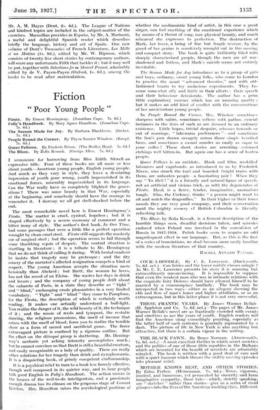Fiction
" Poor Young People "
The Season Made for Joy. By Barbara Blackburn. (Seeker. 7s. 6d.) • People Round the Corner. By Thyra Samter Winslow. (Knopf. 7s. 6d.) I APOLOGIZE for borrowing from Miss Edith Sitwell an expressive title.- Four of these books are all more or less about youthL—American young people, English young people. And much as they vary in style, they leave a desolating impression of youth gone wrong, youth impoverished in its emotional forces, miserably impoverished in its language. Can the War really have so completely blighted the gener- ations ? There was some beauty in that War, especially at the beginning, and somebody should have the courage to remember it. I daresay we all got shell-shocked before the end.
The most remarkable novel here is Ernest Hemingway's Fiesta. The matter is cruel, cynical, hopeless ; but it is shaped effectively by a severe economy of comment and a bitter irony of style.. The author's first book, In Our Time, had some passages that were a little like a perfect operation wrought by clean crnelsteel. Fiesta still suggests the masterly use of surgical steel ; but the operation seems to fail through some throbbing sepsis of despair. The central situation is Startling in literature ; it is a tribute to Mr. Hemingway that we do not think of calling it daring. With brutal candour he insists that tragedy may be grotesque ; and the dry misery of the narrator's affected resignation compels a kind of respect: • The young American accepts the situation more heroically than Abelard ; but Brett, the woman he loves, has not the mood of an Eloisa. She wastes her days in drink and lovers ; and the company of yoUng people drift about the cabarets of Paris, in a state they describe as " tight " and " blind," exchanging crude pleasantries in a very limited vocabulary. " Tight " and " blind " they come to Pamplona, for the Fiesta, the description of which is certainly worth reading. It makes one actually understand a bull-fight. You realize the danger of it, the wild beauty of it, the technique of it ; and the music of reeds and tympani, the ecstatic dancing, the religious processions, the smell of incense that mixes with the smell of blood, force you to realize the terrible show as a form of sacred and sacrificial game. The fierce extravagant picture is confined by a rigorous outline. But the effect on the delraque group is shattering. Mr. Heming- way's sardonic yet aching intensity accomplishes much ; but he cannot convince us that Brett is still a beautiful creature, and easily recognizable as a lady of quality. There arc really other solutions for her tragedy than drink and nymphomania. It is a disquieting book, of grimly competent craftsmanship.
It is a psychical relief to turn to a book less fiercely effective, though well composed in its quieter way, and to hear people talk good English in Folly's Handbook. The action moves in the houses of the well-to-do intelligentsia, and a passionate enough drama has its climax on the gorgeous stage of Covent Garden. Mrs. Hamilton raises the psychological problem of
whether the mediumistic kind of artist, ill this case a great -singer, can- feel anything of the emotional experience which by means of a throat of song, rare physical beauty, and much rehearsal she expresses to perfection. The destruction of Mark, her lover, a being of line but fragile texture, by the greed of her genius is sensitively wrought out in this moving and compact story. The book is quite brilliantly filled with sharply characterized people, though the men are all war- shadowed and listless, and Mark's suicide seems not entirely inevitable.
The Season Made for Joy introduces us to a group of girls and boys, ordinary, sweet young folks, who come to London to practise the usual " advanced theories," and with old- fashioned hearts to try audacious experiments. They be- come somewhat silly and futile in their efforts ; their speech and their behaviour deteriorate. The author has it prim little explanatory manner which has an amusing quality ; but it makes an odd kind of conflict with the conversations of her unvietorious young people.
In People Round the Corner, Mrs. Winslow sometimes sharpens with satire, sometimes softens with pathos. crucial instances in the lives of such as are doomed to an ordinary existence. Little hopes, trivial despairs, schemes towards or out of marriage, " lukewarm preferences "—and sometimes the lion's pow drawn savagely across those simple horrified faces, and sometimes a casual murder as easily as sugar in your coffee ! These short stories are arresting-- coloured etchings well bitten-in. But again one has a sense of beaten people.
Queer Fellows is an antidote. Hank and Slim, unskilled labourers and vagabonds. as introduced to us by Frederick Niven, who struck the trail and boarded freight trains with -them, are unbeaten people—a fascinating pair ! When they say " To Hell ! " it is a friendly and natural figure of speech, not an artificial and vicious trick, as with the degenerates or -Fiesta. Hank is a fierce, tender, imaginative, anomalous tough. Slim, the Cockney. thinks " a person might want to sit and watch the dragonflies." In their higher or their lower moods they are very good company, and their conversation amid the mighty scenery cf British Columbia is literally refreshing talk.
The Blaze, by &flu Kossak, is a fervent description of the horrible things seen, dreadful decisions taken, and miseries endured when Poland was involved in the convulsion or Russia in 1917-1918. Polish books seem to acquire an odd magmiloquent effect in our language. But, as this is the first of a series of translations, we shall become More easily familiar with the modern literature of that country.
RACHEL Ax .tan TAYLOR.














































 Previous page
Previous page